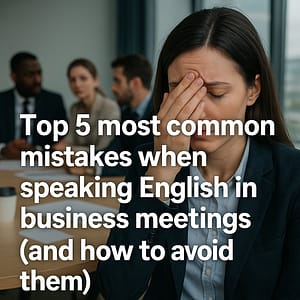
Speaking English in business meetings can be challenging, especially if it’s not your native language. Many professionals make mistakes that may interfere with the clarity of their message or impact how others perceive them. To help you communicate effectively, here are five common mistakes and suggestions on how to avoid them.
1. Incorrect use of verb tenses
One frequent mistake is mixing verb tenses, which can confuse your message. This often happens when discussing the past, present, and future within the same conversation without maintaining coherence.
How to avoid this:
Prepare key phrases before the meeting and practice them out loud. Simulating situations can also be beneficial. In my group classes, we specifically focus on the correct use of verb tenses in business contexts.
2. Lack of clarity in pronunciation
Poor pronunciation can lead to misunderstandings or distort the intended message. Words like «focus» and «sheet» can sound very different if not pronounced correctly, potentially resulting in awkward situations.
How to avoid this:
Record yourself practicing English phrases and compare your pronunciation with that of native speakers. In my group classes, we engage in phonetics exercises and live practice to enhance your clarity and confidence in speaking.
3. Excessive use of filler words
Words like «uh,» «um,» «you know,» and «like» can convey a lack of confidence and diminish your credibility in a professional meeting.
How to avoid this:
Replace these filler words with strategic pauses to better organize your thoughts. In the group courses I teach, we practice strategies to speak more confidently and naturally without relying on fillers.
4. Literal translation from your native language to English
Translating word for word from your native language, can result in grammatically incorrect sentences or phrases that carry different meanings than intended.
How to avoid this:
Familiarize yourself with idiomatic expressions commonly used in business English and learn standard phrases for meetings. In my classes, we focus on these expressions to help you communicate more professionally and fluently.
5. Lack of specific vocabulary for meetings
Many professionals struggle to find the right words when explaining key concepts in English because they are unfamiliar with the appropriate terminology.
How to avoid this:
Expand your business vocabulary by practicing with lists of useful terms and phrases. In my course, we work with real meeting scenarios so you can incorporate the correct vocabulary in practical contexts.
Conclusion
Avoiding common mistakes in English during meetings will help you present a more professional and confident image.
If you’ve ever wondered about «mistakes to avoid in an English meeting» or «how to sound more professional in English,» the key lies in preparation and practice.
I invite you to join my group classes, where you will learn how to communicate with confidence and accuracy in the business world.
